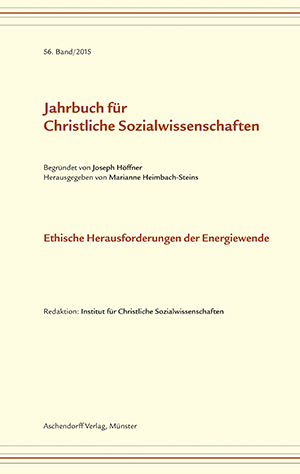Die Moral der Energiewende. Eine Topographie ethischer Herausforderungen
Keywords:
Energie, Wende, Ethik, Transformation, Design, Disaster, Fracking, Ordnung, Politik, Risiko, Zeit, Atommüll, Kirche, SuffizienzAbstract
Zusammenfassung
Der Beitrag stellt die Frage nach den moralischen und ordnungspolitischen Aspekten der Energiewende. Dabei wird zunächst eine Analyse des derzeit vor allem durch Fracking, schwache europäische und globale Rahmengestaltung sowie die verstärkte Kohlenutzung verzögerten Ausstiegs aus der Nutzung fossiler Energieträger vorgenommen. Daran anschließend werden ethische Instrumente zur Beurteilung der Energiewende erarbeitet, wobei methodische Probleme des Risikovergleichs sowie die ungewohnten Zeithorizonte der Atommüllfrage fokussiert werden. Der Beitrag plädiert für Suffizienzstrategien, damit die Energiewende gelingen kann, und diskutiert dabei auch die Rolle der Kirchen. Im Blick auf Akteurskonstellationen, Governance-Strukturen und Kollektivgutprobleme werden Elemente einer proaktiven und kooperativen Gestaltung gesellschaftlicher Übergangsprozesse skizziert, die auf „Transformation by Design“ statt „Transformation by Disaster“ zielen.
Abstract
The essay investigates the moral and regulatory aspects of the energy transition. It starts with an analysis of the delayed exit from fossil-fuel energies, primarily caused by fracking and the enduring attractiveness of coal. In a second step, the essay formulates ethical instruments for evaluating the energy transition, focusing on the methodology of risk comparison and the long-term problems of nuclear waste. The essay pleads for a strategy of eco-sufficiency as a condition of a successful exit from nuclear and fossil-fuel energies. It also discusses the role of the churches in this transition process. The essay drafts elements of a proactive and cooperative design of the processes of transition in the face of actor constellations, structures of governance and problems of public good. It aims at a “transformation by design” instead of a “transformation by disaster.”

